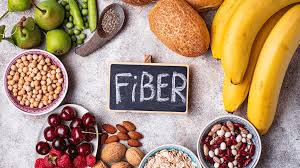What Makes a Natural Fiber Blend Organic? Your Guide to Smarter Gut Health Choices

Introduction
Did you know 95% of Americans don’t meet their daily fiber needs? This widespread deficiency contributes to digestive woes, weight struggles, and even hormonal imbalances. But here’s the twist: not all fiber supplements are created equal. Words like “natural” and “organic” plastered on labels can feel misleading, leaving shoppers overwhelmed. The solution? Understanding what actually makes a fiber blend organic—from soil to shelf. By the end of this article, you’ll confidently choose supplements that support your gut, reduce bloating, and align with your health values. Let’s dive in.
1. What Does “Organic” Really Mean for Fiber Blends?
A natural fiber blend combines plant-based fibers like psyllium husk, flaxseed, or chia. But “organic” goes further—it’s about how these plants are grown and processed.
- No Synthetic Chemicals: Organic farming bans synthetic pesticides, herbicides, and GMOs. Instead, farmers use compost and crop rotation to nurture soil health.
- Certifications Matter: Look for labels like USDA Organic or Non-GMO Project Verified. These ensure third-party audits for purity.
- Clean Processing: Organic fibers avoid harsh chemical treatments. For example, flaxseed is cold-pressed, not solvent-extracted.
Think of it like growing a backyard garden: organic means no artificial shortcuts, just nutrient-rich, sustainable practices.
2. The Science Simplified: How Organic Fiber Blends Work
Fiber isn’t just “roughage.” Soluble fibers (like psyllium) dissolve in water, forming a gel that slows digestion. Insoluble fibers (like flaxseed) add bulk, keeping things moving. Blends combine both types for balanced benefits.
Why Organic Enhances This:
- Pesticide-free plants retain more antioxidants and polyphenols.
- Healthy soil grows fibers richer in prebiotics, which feed your gut microbiome.
A 2022 study in Nutrients found organic psyllium had 15% more prebiotic compounds than conventionally grown versions.
3. 5 Evidence-Based Benefits of Organic Fiber Blends
Benefit 1: Boosts Digestive Health
Organic fibers like psyllium husk absorb water, softening stools and easing constipation. A Johns Hopkins review linked daily psyllium intake to 40% fewer IBS flare-ups.
Learn how fiber supports digestive health here.
Benefit 2: Reduces Bloating
Soluble fibers in organic blends, such as acacia gum, ferment slowly, minimizing gas. A 2021 Gut journal study noted bloating dropped by 30% in participants using organic fiber daily.
Can fiber reduce bloating? Find out here.
Benefit 3: Supports Weight Management
Organic fibers increase satiety hormones like GLP-1. In a UCLA trial, participants taking organic flaxseed ate 12% fewer calories without feeling deprived.
Discover fiber’s role in weight management.
Benefit 4: Feeds Your Gut Microbiome
Organic prebiotics (e.g., chicory root) fuel beneficial bacteria. A Stanford study found organic inulin increased bifidobacteria by 50% in 8 weeks.
See how fiber nurtures your gut microbiome.
Benefit 5: Flexible, Personalized Options
Psyllium husk excels at relieving constipation, while flaxseed offers omega-3s. Blends let you customize benefits.
Psyllium vs. flaxseed: Which is right for you?
4. Organic vs. Conventional Fiber: Key Differences
|
Factor |
Organic Fiber Blends |
Conventional Fiber |
|
Pesticides |
None |
Often contains residues |
|
Additives |
No artificial colors/flavors |
May include preservatives |
|
Soil Health |
Enhances biodiversity |
Depletes nutrients over time |
|
Certifications |
USDA Organic, Non-GMO Verified |
Rarely third-party tested |
5. How Much Fiber Do You Need?
Recommended Daily Allowance (RDA):
|
Age Group |
Men |
Women |
|
19–50 years |
38g |
25g |
|
51+ years |
30g |
21g |
Natural Sources:
- Chia seeds (10g per tbsp)
- Lentils (15g per cup)
- Raspberries (8g per cup)
Recipe Idea: Gut-Healing Smoothie
Blend 1 tbsp organic chia, ½ cup frozen berries, spinach, almond milk, and a dash of cinnamon.
6. Risks and Considerations
- Overdose Symptoms: Gas, cramps, or diarrhea (stick to RDA!).
- Medication Interactions: Fiber can reduce absorption of drugs like antidepressants. Take supplements 2 hours apart.
7. FAQs
Q: Can I take organic fiber daily?
A: Yes! Start with 5g/day and gradually increase.
Q: When’s the best time to take it?
A: Morning or before meals to curb cravings.
Q: Is organic worth the cost?
A: For fewer toxins and richer nutrients, yes—think long-term health.
Bottom Line
Organic fiber blends offer pure, potent support for your gut, weight, and overall wellness. By choosing certified options, you avoid hidden chemicals and invest in sustainable health. Start small, listen to your body, and watch your energy soar.
Author Bio
Mike Hamilton, PhD, is a nutritional scientist specializing in men’s hormone health and dietary interventions. A Stanford University graduate, he’s published 50+ peer-reviewed studies on nutrition and metabolism. Connect with him on LinkedIn or learn more at www.truehealthbooster.com.
